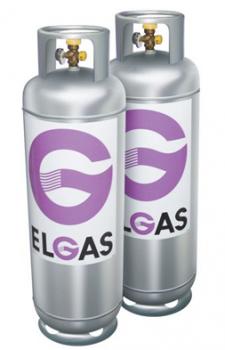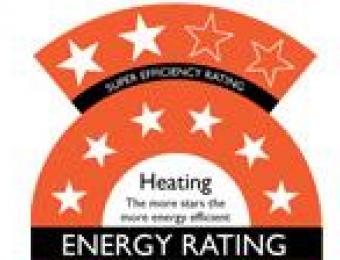Gas can be used to power central heating or space heaters. In most heaters, gas is burned in order to heat air, which is then circulated around the area being heated.

Types of gas
There are two main types of gas used in heaters:
- Natural gas
- LPG (propane)
Natural gas is by far the most common option of the two, and also the cheapest. This is the gas that arrives at the home through a network of pipes if you live in the city. LPG is less commonly used, but is the gas of choice in rural areas and wherever gas piping (also called 'gas reticulation') isn't available to the home.
How efficient is gas heating?
Gas is a much cheaper fuel source than electricity for heating, and a very efficient way to heat your home. Over 90% of the energy used by most gas heaters is converted to heat, making them far more efficient than electricity. Likewise, the CO2 emissions associated with the use of heaters are typically about 30% of what you'd expect from a comparable electric heater. Gas heaters are covered under the Federal Government's energy rating scheme, and as such, they come with energy efficiency labels indicating how efficient they are when compared to similar heaters.
In theory, unflued gas heaters are more efficient than flued gas heaters. Having said that though, the reverse is often the case simply because they require the room they're in to be ventilated, which allows heat to escape. The efficiency of flued gas heaters is very much dependent on how well they're suited to the size of the room. Flued gas heaters should ideally be capable of a heat output equivalent to about 100W per square metre. To get the best results, you should consult a qualified installer about what the best option is for your home.
Most gas heaters come equipped with a thermostat, which will help you control the temperature. When used properly, a thermostat will help to improve the efficiency of your gas heater by preventing the heater from working harder than it needs to.
Health considerations
Gas, while clean and natural, is notorious for the amount of carbon monoxide it produces. This can create problems for people with breathing issues, including asthmatics and those with certain allergies. Likewise, using an unflued heater in a small unventilated room, or using a heater with a blocked flue can be lethal.
Maintenance
There should be no guesswork involved with installation and maintenance of gas appliances. While there usually aren't that many things you need to do in terms of maintaining a gas heater, you should always employ a qualified technician to install and repair them. Every two years you should get your gas-powered heater tested for gas leaks.
What is an Oxygen Depletion Sensor (or ODS)?
If you're using an unflued heater, you should also ensure that you have an Oxygen Depletion Sensor. These are also called 'Oxygen Depletion Safety devices, Oxygen Depletion Systems and various other things, although they're commonly simply known as an ODS.
An ODS is a device which uses a sensor to determine whether the oxygen in the room has been depleted by your gas heater, and shuts the unit off before it becomes dangerous. These systems may also be used on modern gas fires. If you aren't sure whether your heater has (or should have) an ODS, check with the manufacturer or a technician.
If you own a gas heater, you should also learn how to light the pilot light if it has one, and make sure you understand how to operate it properly and fully.
A note about older gas heaters and safety
Gas heaters normally rely on an electric fan mechanism to spread the heat from the heated elements into the air. Although they're becoming increasingly rare, some older (or faulty) gas heaters may continue to burn even if the power's turned off. In most cases - and with just about all modern designs - a thermostat will automatically turn the heater off if this is the case. If you suspect you have a problem with your heater, stop using it and have it serviced by a qualified technician.
|
Advantages
|
Disadvantages
|





